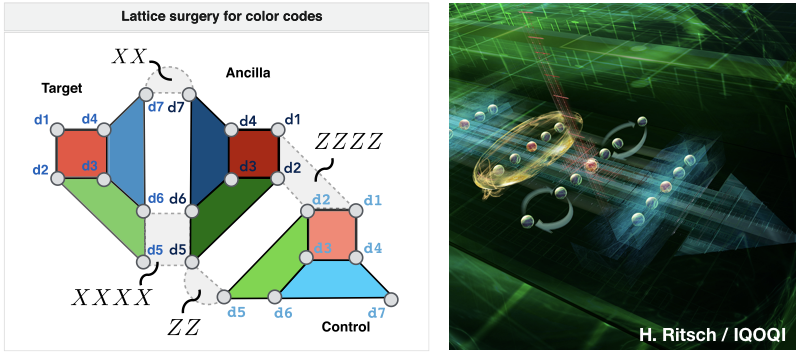Quantum processors are notoriously vulnerable to perturbations, with the resulting decoherence and noise preventing to date the construction of large-scale fault-tolerant quantum computers. Today, one of the most realistic and promising approaches to overcome this problem are topological quantum error correcting codes, where quantum information is stored in interacting 2D or 3D many-body quantum systems. This approach offers the highest known error thresholds, which are already today within reach of the experimental accuracy in state-of-the-art setups.

One of the outstanding challenges in quantum error correction is the realisation of logical encoded qubits, which outperform their physical constituent qubits. In this project, we develop and theoretically explore new extensible and fault-tolerant schemes to achieve such robust logical qubits [1,2], with a focus on state-of-the-art experimental segmented and multi-species ion-trap architectures.

Our work on this project is realised in an international collaboration with leading experimental and theoretical groups in Innsbruck, Zurich, Mainz, Sydney, and Oxford. Here, we are interested in exploring realistic routes towards reliable operation and coupling of logical qubits.
Furthermore, we are working on the microscopic modelling of experimental building blocks and the development and on the development of efficient numerical techniques to simulate logical qubits of increasing sizes. The latter tools allow one to quantitatively study the expected performance of quantum error correction protocols under realistic noise models, including e.g. quantum gate imperfections, qubit leakage and loss, and crosstalk errors, and thereby guide experimental efforts towards reliable quantum processors based on trapped ions and other physical platforms. Recently, we developed and experimentally implemented protocols to deterministically detect and correct qubit losses [3], implement the first fault-tolerant universal logical gate set on two logical qubits [4] and we contributed to the first realisation of repeated quantum error correction in a 17-qubit surface code [5].
[1] Assessing the progress of trapped-ion processors towards fault-tolerant quantum computation
A. Bermudez, X. Xu, R. Nigmatullin, J. O’Gorman, V. Negnevitsky, P. Schindler, T. Monz, U. G. Poschinger, C. Hempel, J. Home, F. Schmidt-Kaler, M. Biercuk, R. Blatt, S. Benjamin, M. Müller
Physical Review X 7, 041061 (2017)
[2] Transversality and lattice surgery: exploring realistic routes towards coupled logical qubits with trapped-ion quantum processors
M. Gutiérrez, M. Müller, and A. Bermudez
Phys. Rev. A. 99, 022330 (2019)
[3] Deterministic correction of qubit loss
R. Stricker, D. Vodola, A. Erhard, L. Postler, M. Meth, M. Ringbauer, P. Schindler, T. Monz, M. Müller, R. Blatt, Nature 585, 207 (2020)
[4] Demonstration of fault-tolerant universal quantum gate operations
L. Postler, S. Heußen, I. Pogorelov, M. Rispler, T. Feldker, M. Meth, C. D. Marciniak, R. Stricker, M. Ringbauer, R. Blatt, P. Schindler, M. Müller, T. Monz, arXiv:2111.12654 (2021)
[5] Realizing Repeated Quantum Error Correction in a Distance-Three Surface Code
S. Krinner, N. Lacroix, A. Remm, A. Di Paolo, E. Genois, C. Leroux, C. Hellings, S. Lazar, F. Swiadek, J. Herrmann, G. J. Norris, C. Kraglund Andersen, M. Müller, A. Blais, C. Eichler, A. Wallraff, arXiv:2112.03708 (2021)
